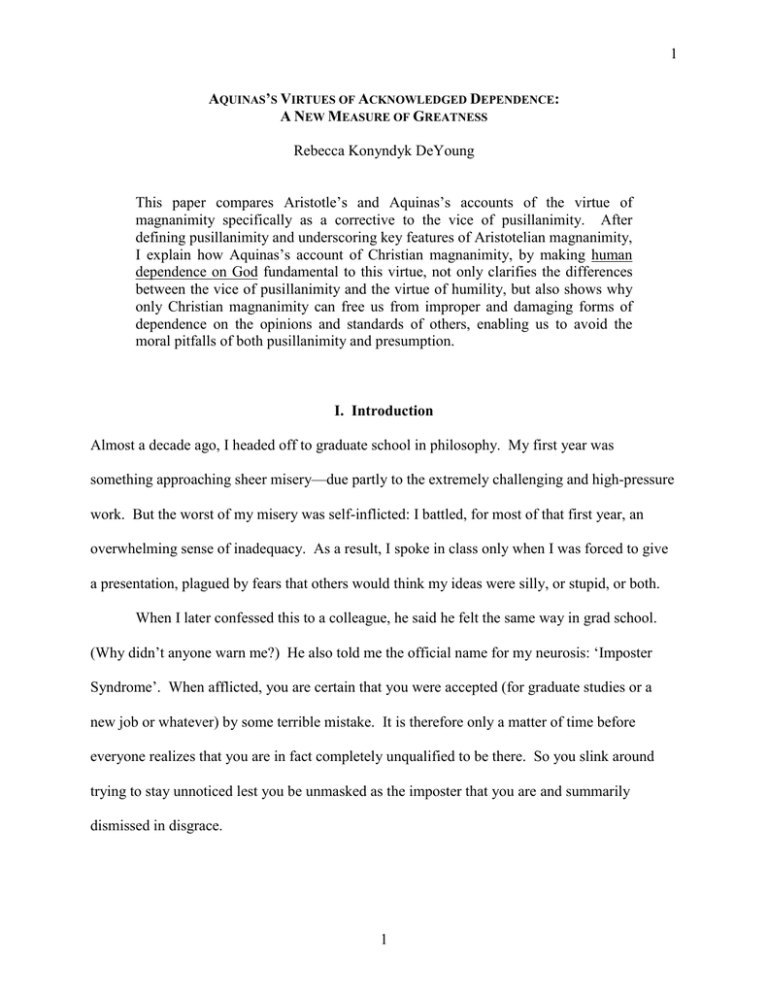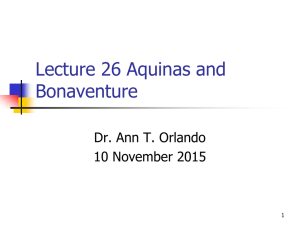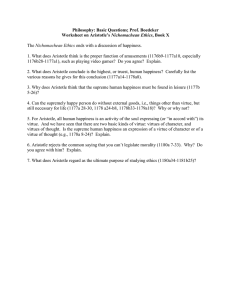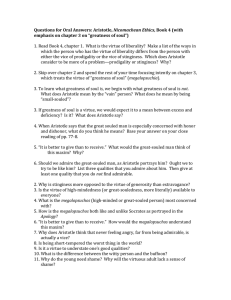1 Rebecca Konyndyk DeYoung
advertisement

1 AQUINAS’S VIRTUES OF ACKNOWLEDGED DEPENDENCE: A NEW MEASURE OF GREATNESS Rebecca Konyndyk DeYoung This paper compares Aristotle’s and Aquinas’s accounts of the virtue of magnanimity specifically as a corrective to the vice of pusillanimity. After defining pusillanimity and underscoring key features of Aristotelian magnanimity, I explain how Aquinas’s account of Christian magnanimity, by making human dependence on God fundamental to this virtue, not only clarifies the differences between the vice of pusillanimity and the virtue of humility, but also shows why only Christian magnanimity can free us from improper and damaging forms of dependence on the opinions and standards of others, enabling us to avoid the moral pitfalls of both pusillanimity and presumption. I. Introduction Almost a decade ago, I headed off to graduate school in philosophy. My first year was something approaching sheer misery—due partly to the extremely challenging and high-pressure work. But the worst of my misery was self-inflicted: I battled, for most of that first year, an overwhelming sense of inadequacy. As a result, I spoke in class only when I was forced to give a presentation, plagued by fears that others would think my ideas were silly, or stupid, or both. When I later confessed this to a colleague, he said he felt the same way in grad school. (Why didn’t anyone warn me?) He also told me the official name for my neurosis: ‘Imposter Syndrome’. When afflicted, you are certain that you were accepted (for graduate studies or a new job or whatever) by some terrible mistake. It is therefore only a matter of time before everyone realizes that you are in fact completely unqualified to be there. So you slink around trying to stay unnoticed lest you be unmasked as the imposter that you are and summarily dismissed in disgrace. 1 2 It might be easy to dismiss this sense of inadequacy as a part of any normal learning experience—or part of the sometimes painful process of ‘growing up’ that we all have to do. Unfortunately, it continues to plague some people well beyond the crucible of self-formation that is our college or grad school experience. And while I have a hunch that this area of struggle may be exacerbated in gender-specific ways and perhaps also by certain theological emphases, it remains a general moral danger. When Imposter Syndrome becomes a chronic condition, rather than a passing episode, it can cripple our ability to use our gifts and fulfill our potential for worthwhile achievements. We become habitual self-underestimators, we believe our selfdisparaging comments about our worth and abilities, and as a result, we fail to live up to all we are called to be. Following Aristotle, Aquinas calls this condition the vice of pusillanimity. Pusillanimity means “smallness of soul”; its “faintheartedness” shrinks back in the face of challenge and difficulty. Its main effect is inaction: we neglect to develop our talents and fail to stretch ourselves toward the fulfillment of our potential. If you are sure you can never achieve anything worthwhile, much less something great, then why bother even to try? Pusillanimity may seem like a mere problem of misperception rather than a moral vice. As Aristotle describes them, the pusillanimous “seem not to be evil people, since they are not evil-doers, but to be in error.” Nevertheless, he continues, “this belief of theirs actually seems to make them worse. For people seek what they think they are worth; and these people hold back from fine actions and practices…because they think they are unworthy of them.”1 The problem with the misperception is that we tend to live up to—or in this case, down to—our self-image.2 Adding to this problem, many of those plagued by a chronic sense of inadequacy think of their condition as a form of humility. I will argue that pusillanimous despair over one’s worth 2 3 and abilities should not be mistaken for the virtue of humility, especially since pusillanimity can be as morally and spiritually dangerous for some as presumption and pride are for others.3 Moreover, I will show that pusillanimity and presumption, unlike humility, both ultimately depend on an untruthful view of the human person. My task in this essay is to analyze pusillanimity and to recover the virtue that provides a remedy for it. Aristotle includes this vice and its opposing virtue, magnanimity (megalopsuchia), in his catalogue of moral habits; Aquinas follows suit in the Summa theologiae. One might reasonably expect that Aquinas, as a Christian theologian working with a very different list of virtues and vices and an equally different vision of human moral perfection and our means to it, would have an account bearing little if any similarity with that of a pagan philosopher, even prima facie. Yet Aquinas is clearly indebted to Aristotle’s discussion of these traits, to the point of modeling his cure for pusillanimity on that paragon of Aristotelian pride, the megalopsuchos or great-souled man. What a deeper look at these two thinkers will reveal is how radically transformed the initially similar accounts of these moral habits become in the context of Aquinas’s Christian commitments. In that context, Aristotelian magnanimity—notwithstanding its merit in counteracting pusillanimity—will turn out to be more a vice than a virtue, and Christian humility—which Aristotle cannot countenance as anything but baseness and vice— becomes for Aquinas not only a virtue but an essential complement to magnanimity. The key transformative feature of Aquinas’s account of pusillanimity and magnanimity is its acknowledgement of our fundamental relationship of dependence on God. Only an acknowledgement of our dependence enables us to grasp the true worth of the self and to live up to our full potential. It is precisely this feature, unavailable to Aristotle, which yields a full remedy for pusillanimity. 3 4 First I will lay out a three-fold analysis of the vice of pusillanimity. Then I will consider Aristotle’s insights about it and the virtue which is its remedy, insights which Aquinas’s account can also affirm and incorporate. Finally, I will consider how locating this set of traits in a Christian context nevertheless demands a further and quite radical transformation of magnanimity from its Aristotelian form, a transformation in which magnanimity partners with humility to yield a fuller and more final cure for both its opposing vices, pusillanimity and presumption. II. Pusillanimity: Diagnosing the vice In Aquinas’s account of pusillanimity, he uses the parable of the talents in the Gospels of Matthew and Luke to illustrate it.4 We have has certain resources or gifts or talents which we neglect to use. We keep them buried in the ground where no one can benefit by them, including ourselves. What would motivate us to do this? Three fundamental reasons, I think, which partner with fear and despair to hold us back from worthwhile achievements and cripple us in the face of challenges. First, pusillanimity results from measuring our value in comparison to others, and negatively so. The faint-hearted person is one who, when considering some action, looks around, sees others doing a much better job, is certain that she will look inferior in comparison or fare poorly by their standards or expectations, and therefore decides not to make the attempt. She shrinks back from acting because her measure of herself and her contributions depends on a ‘horizontal’ standard of comparison. Moreover, her worries about others’ opinions and expectations of her can additionally trap her into measuring her worth by the wrong standards of greatness. According to both of these comparative measures, she finds herself wanting. 4 5 Further, pusillanimity results from the wrong sort of self-reliance. In contemporary America, independence is the premier virtue. Each of us is valuable and valued for ‘autonomous’ achievement, not for depending on others for help. For the pusillanimous person to ask for assistance—and therefore to admit that she needs it—would be to admit her inadequacy to others, something which she cannot bear to do. Yet because she is certain that she could never act successfully on her own either, she shrinks back from the attempt altogether. Her insistence on a completely individualistic ideal of human action, coupled with her negative comparisons of herself with others and her dependence for esteem on their apparently unachievable standards of worthiness, cripples her incentive to act. III. Aristotle’s Remedy: Megalopsuchia In both Aristotle and Aquinas, the vice of pusillanimity is opposed to the virtue of magnanimity by way of deficiency. Faintheartedness is opposed to magnanimity’s greatness of heart, its confidence in facing difficult achievements, and its love of truth that blocks fear about what others might think. According to Aristotle’s account of megalopsuchia, there are three key ways the magnanimous person differs from his pusillanimous counterpart. First, the magnanimous person aims at great acts of virtue, and his desire for honor spurs him on to attempt things genuinely worthy of honor. (On this, both Aquinas and Aristotle agree.) However, the magnanimous person is not a slave to the desire for human honor and acclaim—in fact, he despises them if they come from unworthy sources or for things for which honor is not genuinely due. He attempts and achieves great things because they are appropriate expressions of the excellence that he has, not because he craves affirmation from others or desires glory.5 The Philosopher’s view of magnanimity simply does not make much of human 5 6 opinion. In his commentary on Aristotle’s Ethics, Aquinas’s gloss says that the magnanimous person “is more solicitous about truth than about human opinion… He does not depart from what he ought to do [either by excess or deficiency] because of what others think.”6 Because of his allegiance to truth, including the truth about himself, the magnanimous person rises above the anxieties of a comparative view of his own worth. Further, Aristotle emphasizes that honor is genuinely due to moral excellence—great deeds of virtue—rather than wealth, good birth, or power.7 The magnanimous person has a “moderate attitude” about riches and the like, because he “does not regard honor as the greatest good”, but rather the virtue which makes one genuinely worthy of it. Greatness is not measured by celebrity status or by how much the hoi polloi are impressed by one’s wealth; Aristotelian magnanimity has a more noble view of what makes one truly great. Lastly, Aristotle’s magnanimous person is not the Lone Ranger when it comes to accomplishing great acts of virtue. Without a doubt, the magnanimous person seeks to be selfsufficient, but self-sufficiency in Aristotelian terms contrasts sharply with an American-style denial of our dependence on others. Human excellence depends on receiving a good upbringing in a city with good laws and cooperating with others to rule and defend the city. Even in the limit case of contemplation, Aristotle says it is more easily sustained in the company of friends who share one’s good character.8 To be human is to be social by nature, and our acts of virtue find their place in this structure of human interdependence. In summary, Aristotle’s magnanimous person acknowledges that he depends on others to become virtuous and to exercise virtue, but he is appropriately independent of their opinions and their standards of greatness in assessing his own worth. Because of this, he is able to avoid the damaging forms of comparative self-value and self-reliance that are the pitfalls of pusillanimity. 6 7 And yet, the magnanimous person, on Aristotle’s account, does not give us a model of virtue that a Christian could embrace. Although Aristotle’s megalopsuchos moves beyond a comparative self-value in one way, and certainly beyond a negative comparative self-assessment, his sense of his own excellence still depends on thinking of himself as superior to others. For example, the magnanimous person likes to do favors for others but not to receive them, because benefiting others is a sign of his superiority while receiving help is “slavish” and “inferior”. He is patronizing in his behavior toward others who are beneath him. As Aristotle says in the Eudemian Ethics: “Contempt seems particularly the special characteristic of the magnanimous man…He would be pained if denied honor and if ruled by one undeserving.”9 It is, therefore, no accident that in Aristotle’s world the megalopsuchos must be a man. Thus, even though he measures greatness primarily in terms of virtue, the magnanimous man’s excellence is still valued at least in part because it supercedes that of others whom he outdoes, despises, and condescends to, so that even his gait and tone of voice show him to be above their help, their daily concerns, and their frivolous opinions. The measure of greatness remains inherently comparative, and the standard of comparison is still emphatically horizontal. Further, while he is loyal to the truth about himself above unworthy human opinions, the truth in question is still the truth according to unaided human wisdom, which remains fundamentally incomplete. Finally, although the magnanimous man’s self-sufficiency is defined, for Aristotle, within the parameters of human beings’ social and interdependent nature, Aristotle’s paragon of virtue never gets beyond an ethic of human self-reliance. Individualistic autonomy is left behind, but human autonomy remains. Virtue is achieved with the help of others who provide good legislation and good upbringing, but this human effort, here collectively considered rather than 7 8 narrowly individualized, is both necessary and sufficient for the greatest achievements of human excellence.10 IV. Aquinas and Acknowledged Dependence Aquinas, as a Christian thinker, cannot therefore merely subsume Aristotle’s account of the moral virtues into his own. His commitment to a creative, providential, and redeeming God demands a transformation of this Aristotelian virtue. A comparison of the two accounts will show why Aquinas, as a Christian, concludes that Aristotle’s remedy for pusillanimity—for all its truth and moral insight—nevertheless fails to liberate the self from a fundamentally comparative self-value and from limiting and incomplete measures of greatness. From the perspective of a Christian moral vision like Aquinas’s—one that comprehends more than human wisdom and human agency—Aristotelian magnanimity fails to go far enough to ultimately free the self from the improper dependence on human standards and the opinions of other people which are pusillanimity’s main pitfalls. In another way, however, from this perspective the Aristotelian virtue also goes too far in claiming independence for the self and falls into pusillanimity’s opposite vice, presumption. While pusillanimity claims too little for the self; presumption claims too much, neglecting to acknowledge that its virtuous achievements are the fruit of an unmerited gift and that the self is ultimately dependent on one greater than itself for all its worth and goodness.11 Ironically enough, Aquinas uses Aristotle’s own notion of friendship to explain how Aristotelian magnanimity is actually presumption: As the Philosopher says (NE iii.3 1112b25), ‘What we can do by the help of others we can do by ourselves in a sense.’ Therefore since we can think and do good by the help of God, this is not altogether above our ability. Hence it is not presumptuous for a person to attempt the accomplishment 8 9 of a virtuous deed; but it would be presumptuous if one were to make the attempt without confidence in God’s assistance.12 Aquinas’s Remedy: Magnanimitas. While Aquinas draws heavily on Aristotle and his insights in constructing his own account of Christian magnanimity, his insistence on human beings’ fundamental relation of dependence on God transforms this virtue and provides the key to fully overcoming pusillanimity. For Aquinas, magnanimity is only a virtue, and only compatible with Christian humility, when it is a virtue of acknowledged dependence on God. In contrast, pusillanimity and presumption are both failures—albeit in different directions—to depend on God in our attempts to do good. Magnanimity is a wholehearted readiness to attempt the great acts of virtue to which we are called, however impossible or daunting the task may seem and however much the attempt may ‘stretch’ us. According to Josef Pieper’s description, magnanimity “always … decides in favor of what is, at any given moment, the greater possibility of human potentiality for being.”13 The main difference between Aristotelian and Thomistic magnanimity is that for Aquinas, this virtue and its operation are possible only through God’s gift of grace—a gift for which we are dependent on a God who is greater and more powerful than we are. Magnanimity is thus fundamentally conceived in terms of vocation and stewardship: it is a response to God’s call, and willingness to use his gifts. As Aquinas says: “Magnanimity makes us deem ourselves worthy of great things in consideration of the gifts we hold from God; thus if our souls are endowed with great virtue, magnanimity makes us tend to perfect works of virtue…”.14 The apostle Paul expresses the heart of magnanimity when he says, “I can do everything—through Christ who gives me strength.”15 With this general conception in mind, we can see how Aquinas’s account of magnanimity transforms Aristotle’s understanding of self-reliance, self-value, and the measure of greatness. 9 10 Self-reliance. In the prima secundae, Aquinas privileges Augustine’s definition of virtue: it is “a good quality of the soul by which we live rightly…which God works in us without our help.”16 Virtue, for Aquinas, is a gift of grace, not something we accomplish on our own. So when he frames magnanimity as a part of fortitude, he describes the confidence of a magnanimous person as a hope and faith in someone who is willing to help us.17 We can have hope about accomplishing good, especially when this is difficult, because we need not make the attempt relying solely on our own power. Thus even as he uses Aristotle’s account of magnanimity, Aquinas consistently emphasizes God’s power to work good in and through us, and not our own ability.18 Like Aristotle, he assumes that one needs to be a person of great resources to have this virtue, but the nature of those resources—i.e., grace—and the sense in which they can be our own—i.e., through the friendship of charity—become radically different. Magnanimity thus requires trust, not in ourselves, but in God’s assistance. As Dietrich von Hildebrand puts it, The question whether I feel worthy to be called is beside the point; that God has called me is the one thing that matters. Having abandoned all pride and all craving for being something of my own resources, I shall not doubt that God, from whom I receive everything, also has the power to lift me up and to transform any darkness into light.19 For God’s power in us to be efficacious, we must be willing to receive God’s gracious assistance, to receive it as a gift, and to trust that what is needful will be given. Precisely because magnanimity depends on God’s power and trusts his goodness, it protects us from smug presumption on the one hand and pusillanimous despair on the other. Both vices are caused by a view of the self and its accomplishments without the aid of grace. The first takes the form of thinking our own power is sufficient for goodness so that we are independently worthy of honor; the second thinks that since we are absolutely helpless and hopeless on our own there is no 10



